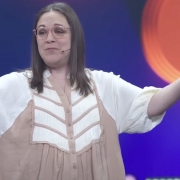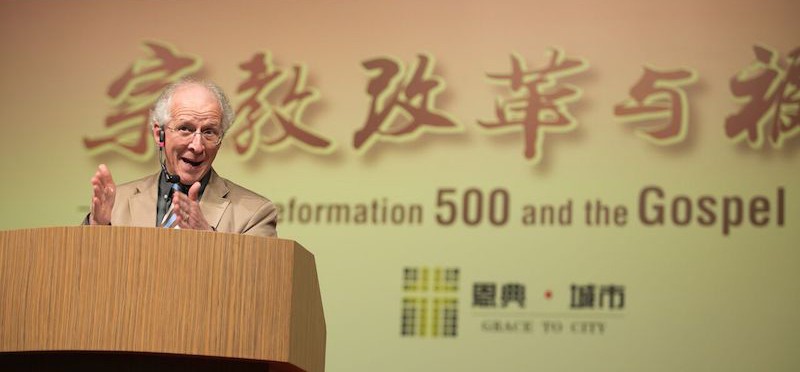The Way Down is about the weight of power being wielded by a hierarchical God
This article originally appeared on November 18, 2021 at Baptist News Global.
It was an overcast morning near Smyrna, Tenn., as a small Cessna private jet abruptly descended toward the earth. Seven people on board, who had been looking forward to a trip to Palm Beach, Fla., were now taking their final breaths. And as the plane crashed into Percy Priest Lake on the morning of May 29, 2021, the author and pastor Gwen Shamblin Lara along with her husband Joe Lara, son-in-law Brandon Hannah, and four other church leaders were tragically killed.

Gwen Shamblin Lara
Gwen Shamblin Lara had been a weight control consultant through the 1980s and came to international prominence after developing the “Weigh Down Workshop” program that began in a Baptist church and grew to 21,000 classes and more than 250,000 participants by 1998. Her book, The Weigh Down Diet, sold more than 1.2 million copies. Then in 1999, she planted the Remnant Fellowship Church in Brentwood, Tenn.
Lara became the subject of a documentary series on HBO Max titled The Way Down: God, Greed, and the Cult of Gwen Shamblin, which was released with three episodes in September 2021. As the series develops, it becomes clear that the producers believe Remnant Fellowship Church, where Lara served as the founding pastor until her death, is a cult.
Of course, the church put out a statement saying Remnant Fellowship “categorically denies the absurd, defamatory statements and accusations made in this documentary — yet another Hollywood attack on religion.”
Remnant Fellowship “categorically denies the absurd, defamatory statements and accusations made in this documentary — yet another Hollywood attack on religion.”
They also have a statement on their website by J. Gordon Melton, a professor of American religious history at Baylor University, saying that based on his visits to the congregation, “the church presents itself, apart for its few unique beliefs, as just another suburban Protestant congregation, not unlike the Baptist, Adventist, Methodist and Presbyterian churches with whom they share space in the city … Yet in spite of the averageness of its members, the Remnant has been accused of being a ‘cult.’”
Melton goes on to say that the word “cult” is a word that “has lost any value in the study of religious groups,” that it “has devolved into a mere label to denounce groups,” and that Remnant Fellowship does not seem to have “‘cultlike’ tendencies.”
Damning witnesses
Yet, The Way Down puts forth a damning set of witnesses and former church members who claim to have been abused by Remnant Fellowship. One former recruit named Adam Brooks said, “It’s not ’til you get a good way in that you see some of the other stuff that’s behind the curtain.”
While one person points out the common sighting of churches on every corner in the South, they explain, “You would never guess that this church was so different from all the others.”
But is it so different from the others? Since the documentary sets up a comparison, how does Remnant Fellowship stack up to other ministries?
“Gwen Shamblin’s motivation isn’t money. It would almost be easier if it was. But I think her motivation is power.”
Many of the conversations around cult-like ministries over the past few years have been about “health and wealth” preachers who use the promise of future financial blessing to bribe their followers into giving money.
But while Lara certainly had her share of wealth, her overall message as seen in The Way Down documentary series did not seem to reflect the overt health and wealth pleas for cash that have become so easy to recognize. Glen Wingerd, a former Brentwood resident, said: “Gwen Shamblin’s motivation isn’t money. It would almost be easier if it was. But I think her motivation is power.”
And with that observation, one must wonder how her ministry might compare with the many mainstream conservative evangelical complementarian churches that also obsess over power.
God wields power over all
It makes sense that Lara would be accused of being obsessed with power, given that her fundamental way of viewing God was through the lens of power. She said that God is “jealous of us worshiping objects more than him,” told a group of children that “it’s all about God,” and declared, “I am right now on fire for God to get his way. That’s what I want! God to get his way!”
To many Christians, hearing that “it’s all about God” may sound good. But when it’s framed within a construct of God “getting his way,” this subtly reveals a hierarchical picture of a God with flexed muscles rather than a God within and among us with outstretched arms.
Lara reveals the hierarchical nature of her theology while describing her weight loss program, saying, “What I do in this program is teach people how to stop bowing down to the refrigerator and how to bow back down to him.” She also was careful to frame it within the context of love, saying that it was about falling out of love with food and in love with God.
“Lara reveals the hierarchical nature of her theology while describing her weight loss program.”
She told Larry King in 1998: “We were made to be addictive. And I’m not asking people not to be addictive. I’m saying transfer over this addiction to God.”
How is this transfer of addiction any different that John Piper’s “Christian hedonism,” which he describes in Desiring God as a belief that “the longing to be happy is a universal human experience … we should never try to deny or resist our longing to be happy … instead, we should seek to intensify this longing and nourish it … the deepest and most enduring happiness is found only in God?”
What eventually got Lara in trouble with evangelicals was when her hierarchical view of God led her to deny the Trinity. Her reasoning was that “God is above all.”
Ironically, many leading complementarians also have been accused of denying the Trinity due to their hierarchical view of God. In The Grand Design, Owen Strachan says, “The Father is the authority of Christ, and always has been.” Wayne Grudem said, “I hold to the eternal submission of the Son to the Father.”
In The Story of Christian Theology, church historian Roger Olson explains that in the fourth century, Arius began to teach that we were to follow “Christ’s example of submission to God.” He explains that orthodox Christian theology links “the Son’s essential identity with the Father,” while Arianism links “the Son’s identity with the creatures” and connects Jesus to the Father through “conformity of will.” The result of Arius framing Jesus as being in subordination to the Father was that more than 300 bishops condemned his teaching as heresy.
So while Gwen Shamblin Lara used hierarchy to say that the Trinity can’t sufficiently explain the person of God, these leaders of conservative complementarianism go even further to break up the Trinity into a heretical hierarchical power structure.
The pastor wields power over the church
The role of the pastor at Remnant Fellowship has to be seen in light of their power dynamic with God and the Bible. As the series points out, they believe that “the Bible is literally true,” and that “all the answers are in the Bible.”
While it is understandable that evangelicals would want to promote the authority of the Bible, it is important for them to recognize the power dynamic that happens when they believe the Bible has all the answers and the pastor is the one who teaches the Bible.
One former member said, “The overarching theme of everything that she ever taught in there was always being under God’s authority, which was her.”
“The overarching theme of everything that she ever taught in there was always being under God’s authority, which was her.”
But how are pastors seen in other conservative evangelical churches?










Leave a Reply
Want to join the discussion?Feel free to contribute!